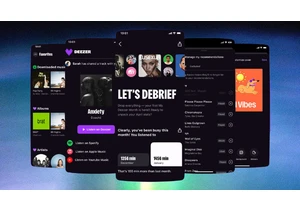Chef Amanda Shulman is chattering away as she expertly whacks a pile of charred beets with a knife and tosses them into a bowl. “I just want them to be roughly chopped,” she says. “I like when things are recognizable. You should be able to take a bite [of a dish], and it should be full of all these things, not, like, minced.” Shulman is prepping a course—leek and Gruyere fritelle—for dinner that night at her Philadelphia pop-up restaurant, Her Place Supper Club, which became an overnight sensation when it opened its doors last summer. She’s in the kitchen at the restaurant, but the people she’s talking to are part of a virtual audience who have gathered to watch her on a new digital food-and-cooking platform called Kittch. [Screenshot: Kittch] The platform has a free and easy vibe—at one point, Shulman can’t find a place to put her laptop (the stove is too hot), so she starts streaming from her phone. Viewers, who are part of a select group called Chef’s Table, jump in and ask questions (“Where did you get that cheese?”), send emojis as a form of applause, and laugh at Shulman’s self-deprecating, off-the-cuff humor. Cofounded by media veteran and entrepreneur Brian Bedol (who founded the sports channels that would become ESPN Classic and CBS Sports Network); Doug DeLuca, a coexecutive producer on Jimmy Kimmel Live; and Elana Karp, the former head chef and cofounder of Plated, Kittch is essentially Twitch for culinary enthusiasts and chefs. “Culinary creators,” as Bedol prefers to call them. Currently in beta mode with $5 million in seed funding led by KarpReilly LLC, and a glittering cast of founding members, including Marcus Samuelsson (Red Rooster Harlem); Chris Bianco (Pizzeria Bianco); and James Beard-winning chef Chris Shepard (Underbelly), the platform is a 24/7 live stream of cooking classes, wine tastings, brewery tours, recipe trials, documentary-style videos, and any type of live feed that chefs—and brands—want it to be. [Screenshot: Kittch] It also provides a way for chefs to add new revenue streams and grow the digital side of their business, something that has become imperative as the pandemic has wreaked havoc on the traditional, brick-and-mortar restaurant industry. Chefs can opt to stream content for free on their channels or charge viewers—via tokens called “clams”—for special experiences and classes. Viewers can also tip chefs with clams at any time, and an e-commerce feature is being worked on. There also will be opportunities for brand partnerships and sponsorship deals. “It frees you up,” says Shulman, who in the early days of the pandemic taught Zoom cooking classes to make money. “Instead of adding a brunch service, I could teach a cooking class on Saturday morning [on Kittch] from my home and probably make the same amount of money with less overhead.” But more than anything, Kittch is a place “where people who love food hang out with people who love food,” says Bedol, who is also Kittch’s CEO. You can tune in casually, or “you’ll be able to have your own custom Chef’s Table”—a VIP-type experience where a certain number of clams gets you a private viewing of a chef in action—”so you’ll be able to invite a bunch of friends and have a special session with a chef. It’s designed to be a very social place.” The unbundling of Twitch begins If Kittch sounds like a mashup between Twitch, YouTube, and Zoom, it is. But unlike those platforms, it has a distinctly curated, high-end feel, à la Instagram. The 50 chefs who were selected to join the platform during alpha mode are mostly pedigreed, known personalities with James Beard awards and Michelin stars. Similarly, the consumer product brands being invited to create content and build out their own channels on Kittch are upscale, boutique labels, such as Made In cookware and Domenica Fiore olive oil. The latter shot a lushly produced, six-minute, doc-style video of harvesting olives at night in Tuscany. The film lovingly shot workers gathering the fruit “under the stars,” and the finished product—a thick, shimmering green liquid—being poured tantalizingly from a wine glass, as a master olive oil maker narrated the process. “Kittch has a certain aesthetic and sensibility,” says Jake Kalick, cofounder and president of Made In. “For us, a performance cookware brand that is a little bit premium in nature—though we don’t lead with the term ‘premium’—it’s a really great interface, and it’s easy to use. You feel like you’re using a platform made for absorbing content in a smart way.” [Screenshot: Kittch] Bedol says that as Kittch—which is free to use—grows, it will open up to more layers of creators and users. (By January 2022, it should be open to all users. Individuals are currently being added gradually from a waitlist that you can access here.) Ultimately, the ambition is to build a community of both established names and up-and-coming chefs who, say, are building out their community from TikTok or trying to expand their business beyond a new pop-up restaurant or ghost kitchen. “The goal is to be a diverse, democratic place where as you build a following, you build the ability to monetize, and you’re able to really take advantage of the platform as a place of discovery and a place of community,” Bedol says. “In two years, we would love to see 10,000 or 20,000 chefs on the platform. We don’t envision it as a place that is trying to be exclusive and exclusionary. We envision it sort of like Twitch, where you’re able to see who the most popular creators are.” Samuelsson credits Kittch with “democratizing our profession. It helps the next generation of great chefs be more like street artists than classically trained chefs.” Kittch Confidential Bedol’s aha moment for Kittch came during the pandemic as he watched the restaurant industry turn on its head, supplanted by food delivery and ghost kitchens. “Chefs were struggling to survive, and suddenly online food” was exploding, whereas “before COVID-19 hit, a lot of people were hesitant to order food online,” he says. “I was helping chef friends navigate this new world, and I realized it was crazy that a vertical platform didn’t exist for culinary creators. More importantly, I realized that everything that was going on on the internet was transactional. Yet hospitality is such an important part of the culinary experience. Hospitality is live, social, and communal.” Also noteworthy: Food and cooking is a $500 billion market that “generates billions of dollars of commerce driven by content,” Bedol says. Kittch doesn’t have pre-roll ads or any kind of traditional advertising. Instead, the business model is built around brand sponsorships that chefs can also participate in, and revenue shares between Kittch and creators on premium or paywall content. Soon, there will also be an online marketplace where users can buy tools that chefs are using or ingredient boxes for meals. Here, too, there is potential for chefs to receive a revenue split for an ingredient box or a fish-fry basket they recommend using—and for brands to hawk their products. “The e-commerce is interesting,” says Made In’s Kalick. “But a huge part of what Kittch offers is really just brand awareness. Every day it’s more expensive to advertise on your classic digital platforms. If you can create engaging content that fans love, they might not go to Made In’s website right away and start purchasing things, but they’ll recognize Made In as a trusted tool used by all these chefs, and eventually become customers. So, for us, it’s an acquisition channel as well.” The secret ingredient for chefs The immediacy that Kittch provides is perhaps its greatest innovation for chefs. Content creation is at a chef’s fingertips via a “mission control” dashboard, as Bedol calls it, that allows them to set up and distribute their streams and create closed or open environments for users. They can notify followers that they’re about to go live with a recipe test, for example, and even download a recipe to be attached to the stream. Shulman says that she is thinking about setting up live streams for dishes that will be available later on at dinner service, and then, after a meal, offering opportunities for viewers to watch her break down a recipe. “You don’t want to feel like you’re always trying to create something when you’re already making content naturally,” she says. “So the way I see it, Kittch is a platform where you capture what you’re already doing, and it kind of pulls back the curtain on the most amazing content in the world that’s just happening.” [Screenshot: Kittch] Shep Gordon, the entertainment and culinary manager who’s worked with Emeril Lagasse, Daniel Boulud, and Wolfgang Puck, and who is also a founding member of Kittch, says that back when he was building the brands of celebrity chefs, “Artists had to go through a huge filtering system [that] mostly compromised what their vision was,” he says. “The beauty of [Kittch] is that the artist can be who the artist is. “Also, there’s the ability for the audience to find the next stars, rather than being manipulated into who the next stars are. There are spots for the smaller players, too. There are a lot of chefs who don’t want to do 30 restaurants, but they still want to send their kids to private school. This gives them a way.”
Login to add comment
Other posts in this group

Amid the video podcast boom, Netflix is making its own move into the space.

If real Easter eggs aren’t your thing this weekend, you may find hunting for digital ones more enjoyable. And there are some cool ones to find at your fingertips, provided you have an iPhone or Ma

With music streaming, users have gotten used to being at the mercy of algorithms. But French music streamer Deezer is making it easier for its subscribers to make the algorithm work for them.

Trying to get from point A to point B? If only it were that simple! With any manner of travel these days, you’ve got options: planes, trains, buses, ferries, and beyond. And finding the best

When Twitter cofounder and Medium founder Evan “Ev” Williams was planning his 50th birthday party, he didn’t know who to invite. Having spent more of his life building and scaling tech

If you thought you’d heard the last of the viral “Apple” dance, think again. The TikToker behind it is now suing Roblox over its unauthorized use.
Last year, during the height of Brat su

A Wall Street Journal report this week gave an extensive look into how Elon Musk, the
